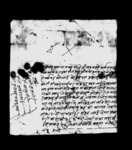A sale deed of a slave in Pyūthanā (VS 1971)
ID: K_0281_0051
Edited and
translated by Axel Michaels
in collaboration with
Manik Bajracharya, Rajan Khatiwoda and Raju Rimal
Created: 2017-03-04;
Last modified: 2018-06-19
For the metadata of the document, click here
The accompanying edition, translation/synopsis and/or commentary are available under the terms of the Creative Commons Attribution-ShareAlike 4.0 International License
Abstract
This is a deed of sale recording the purchase of a 16-year-old slave from Pyuṭhānā for 120 rupees.Diplomatic edition
[1r]
श्रीः\नं१११६३नं[fingerprint of Dharma Bahādura Malla][fingerprint of Mansu Giri]साछीऐंवश्नेमन्सुगीरी¯¯¯¯¯¯¯१[fingerprint of Kālu Giri][?]ऐंकालुगीरी¯¯¯¯¯¯¯१[fingerprint of Amṛte Damāī]ऐंऐंअमृतेदमाई¯¯¯¯¯¯¯१[seal of Ḍillī Bahādura Malla]ने•सु•डिल्लीवाहादुरमल्ल¯¯¯¯¯¯¯¯¯१1[?]षितम्प्युठानामध्येमौजेधुंगाउवश्नेधर्मवाहादुर2मल्लआगेमेरावुवासंगमेराअंसमाआये़कोनैनेकमा
3रोवर्ष१६कोलाईमोहरू१२०अक्षेरूये़कसय़⟪विस⟫रूपैञा
4माऐंऐंवश्नेदाजीनरवाहादुरमल्ललाईदिय़ाआज
5वाटदामपाकोमेरोमामपाकोमाललिनेमालध
6निकोम्यादभीत्रऐंबोमोजींकोछारेरोगमाहा
7रोगअरुषुंषपटनिकलेछ•भनेम्यादभित्रमालवा
8पस्गरुलारुपैञाफिर्तादिउलाभनिमेरामनो
9मानषुसिराजीसंगपरम्भट्टकोकागजलेषीम
10जकुरदाजीनरवाहादुरमल्ललाईदिञाये़सबे
11होराकासाछीफट्केपट्टीलेखीय़ाकासदरछं
12ईतीसम्वत्१९७१सालमितिश्रव़णगते१९रो
13ज२शुभ्म्¯¯ ¯¯ ¯¯ ¯¯¯
Translation
[1r]
Number 11
Number 163
[Fingerprint of Dharma Bahādura Malla]
[Fingerprint of Mansu Giri]
Witnesses:
Mansu Giri, resident of idem --- 1
Kālu Giri, [resident of] idem --- 1
Amṛte Damāī, [resident of] idem --- 1
Ne. Su. Ḍillī Bahādura Malla --- 1
[seal of Ḍillī Bahādura Malla]
Written [by] Dharma Bahādura Malla, resident of Dhūṃ village within the territory of Pyuṭhānā. Āge: I have given the 16-year-old slave [named] Naine, who came [to me in] my share of inheritance from my father, to [my] brother Nara Bahādura Malla, resident of idem, for mohara rupaiyā 120, in words one hundred twenty rupees. From today onwards I possess the money, and the owner (i.e., Nara Bahādura Malla) possesses the chattel (i.e., the slave) that he took. If, according to the Ain, within the [legal] time limit the slave is found to suffer from epilepsy, any major disease or any other deficiency, I will take back the chattel within this period and return the money. I have freely and of my own will written [this] paramabhaṭṭa deed and handed it over to the aforementioned brother Nara Bahādura Malla. [The names of] the witnesses to this act written in the [left] margin are valid.
Monday, the 19th solar day (gate) of Śrāvaṇa in the [Vikrama] era year 1971 (1914 CE). Auspiciousness.
Commentary
This deed of sale involving a slave (parambhaṭṭā) is written in a commonly found format, which includes such features as the number of witnesses, the price and a formal declaration of honest intent. The document along with several other similar ones in the corpus belongs to a category relating to slavery in which the slaves in question are seen to have been regarded as hereditary chattel.

